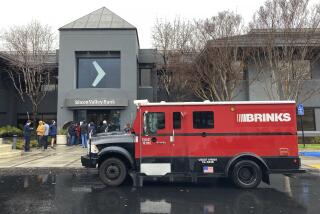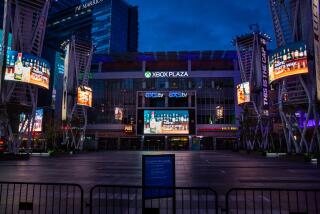In Ferguson, strip mall sets the stage for nightly drama
- Share via
Reporting from Ferguson, Mo. — Barbershop owner Antonio Henley, a burly man in a smock labeled “Tony Da Boss,” was surveying the few customers who had ventured in for haircuts, and the unusually large number of empty chairs. “My shop has never been this empty on a Friday,” he sighed.
A few doors down, the windows at Yolo Boutique were covered over with plywood and a spray-painted sign: “Open! Black Owner!” it said. “You! destroying our business in the community is not helping. Stop the violence!”
This small strip mall — a cellphone store, a nail salon, a burger bar, the cheerful Prime Time Barber Shop — has been at the epicenter of protests over the police shooting of 18-year-old Michael Brown.
By night, over the last two weeks, it has been the backdrop to surreal scenes of tear gas clouds, gunshot victims, riot police and marauding looters. By day, the mayhem gives way to shopkeepers with push brooms and business owners like Henley, fretting over how they’re going to talk citizens into putting down their protest signs and sitting down for a haircut.
Now, the National Guard is pulling out of town, but nighttime protests have continued. No one is sure when this stretch of West Florissant Avenue will return to normal — or if anywhere in Ferguson can ever return to what it was before Aug. 9, when a white police officer shot Brown, who was black and unarmed, six times outside a crowded apartment complex.
At the barbershop, Henley, 44, faces the challenge of both luring his customers back and figuring out how to make up for two weeks of lost revenue.
Most of the proprietors at this narrow commercial strip say business is down more than 60%.
Sonny Dayan, whose cellphone business just down from Prime Time had its windows shattered and contents looted, has said he is determined to stay in business but can’t risk getting his merchandise wiped out again. Damages and losses were estimated at $25,000.
“When can we go back to normal and get the people’s trust back?” he said.
On Friday afternoon, the long turbulent nights had given way to sunshine. A lone protester — an elderly black man — walked by carrying a sign he’d fashioned from a piece of a cardboard box.
“Is the dream still alive?” it said.
For much of the last two weeks, Prime Time Barber Shop and the businesses alongside it have been the stage for a constantly shifting drama. The strip has been by turns shopping center, parade ground, riot zone, first-aid ward.
Police commandeered the barbershop at one point last week, hauling a female shooting victim inside and ordering the barbers into the street.
“Next thing we know, police officers in riot gear are all lined up out front and we’re running with the crowd,” said Thomas Bradley, who works at Prime Time.
Bradley, a bearded, lanky, 25-year-old joker, is also a paramedic. That night, he helped carry a man shot in the face with a rubber bullet to safety. He fashioned a makeshift splint out of tree branches for a woman wounded in the leg as she fled the tear gas.
One evening this week, as Bradley scanned scores of protesters filing past the barbershop, he spotted a young black man wearing a red, white and blue gas mask. The youth offered it for $10. The barber scoffed.
The youth wandered off, vowing under his breath, “I’m going to use this tonight.”
A little after 8 p.m. only one of the strip mall businesses was still open: Ferguson Burger Bar & More, which unlike surrounding outlets, was doing a brisk business serving protesters, reporters and those who streamed in merely to watch the unfolding events.
The day before, a man had dashed in and grabbed $20 from the tip jar. Owner Charles Davis, 46, brawny and bearded, gave chase, but didn’t recover the money.
This night, there was a 20-minute wait for fare that included okra, tripe, peach-glazed chicken wings and a “Garbage Burger” topped with bacon and fried egg.
“My slogan is, ‘The food that tap dances on your tongue,’” Davis announced to the crowd packing a handful of booths around 9:30 p.m.
Half an hour later, two men began fighting in the parking lot. Police in riot gear quickly surrounded them. Davis rushed to the door, locking it and instructing patrons not to let anyone in.
Minutes later, the fight was over. One man was arrested, hauled off to the command center up the street.
As it turns out, it was Henley’s son, also a barber. Henley had returned from coaching his pee-wee football team and turned on the news to see his son getting handcuffed. Now he was on the phone to the shop with Bradley, demanding an explanation.
“Lil Tony” had been trying to clear some unruly youths from the parking lot, Bradley told him. When they challenged him, he fought back.
Henley pulled up minutes later, still wearing his purple Prime Time Panthers T-shirt.
“I’m proud of him, standing out here and protecting his family business,” he said.
Down the way, the co-owner of the burger bar discovered the fight had left her new silver Impala dented.
“This is just too much,” she murmured, tears flowing.
Across the street, protesters began gathering. Bradley shook his head.
“And so it begins,” he said.
No sooner had the crowd reached substantial numbers than the St. Louis County Police, or “county browns,” as Bradley calls them, began striding forward.
An officer’s voice sounded over a bullhorn, “Keep walking on the sidewalk and remaining peaceful.”
“Here comes the tear gas,” Bradley predicted.
Instead, the crowd thinned. The conflict fizzled. Protesters began to blare “What’s Going On,” the Marvin Gaye classic, as they marched.
But by 11:30 p.m., they were again massing across the street. Dozens of police surrounded them with military vehicles.
“They’re gonna get tear-gassed. It’s about to happen real soon,” Bradley said as he stepped outside to watch. Henley swept up cigarette butts from the parking lot, unfazed.
Again came the bullhorn: “Please disperse immediately!”
“That’s the last thing I heard before I had tear gas in my face,” Bradley said.
But police held off. They used dogs instead, shifting the crowd up the street during the next hour — toward the barbershop.
The officer on the bullhorn soon turned his attention to Bradley, shouting, “You need to be on the other side of the Nail Trap sign!”
Bradley dropped back quickly, rushing inside the shop as Henley grudgingly joined him. Events outside were playing out on the shop’s television, tuned to CNN.
As they watched, troopers and St. Louis County police snatched a handful of men from the crowd, handcuffed and carted them away — including one of Prime Time’s regular customers.
It was now past midnight. At 12:53 a.m., Lil Tony finally called his father from jail. He had been arrested, but would be released without bail or charges. Henley closed up and left to pick him up.
No one had been tear-gassed or shot, no Molotov cocktails had been thrown, but 47 people had been arrested.
By the time the burger shop reopened shortly before 9 a.m., news of Lil Tony’s arrest had spread.
“That could have been me,” said Davis, the owner.
Some friends volunteered to help secure his restaurant.
Outside, the street was quiet. But by late afternoon, the protesters’ ranks had multiplied again. Several dozen were marching, chanting, “No justice, no peace.” One woman carried a handmade sign that said, “Repair Ferguson businesses.”
The strip mall’s parking lot was full, but the barbers said that was not promising for business: Many of the cars belonged to protesters. Half the chairs were empty. One of this week’s cancellations was a witness to Brown’s shooting, too stressed to venture out.
By dusk, Nail Trap owner Steve Huynh, whose parents opened the salon 15 years ago after emigrating from Vietnam, was also heading home.
As he finished his dinner of sweet-and-spicy wings from the Burger Bar next door, Huynh, 23, said the protests hadn’t been completely bad for business: Customers were drawn to his latest product line, acrylic nails painted with such slogans as “RIP Mike Brown,” “Don’t shoot!” and “Justice.”
When Huynh decided to board up, he contacted the clothing boutique and cellphone stores next door to see if they were going to follow suit. Dayan, the cellphone shop owner, declined.
He said he trusted his neighbors to protect him.
Born in Israel, Dayan moved first to the Los Angeles area, then to his wife’s hometown of St. Louis. Customers at his first store in St. Louis not only suggested he move here, they found the strip mall and helped him succeed.
The day after the looting, some of those same customers showed up with brownies and volunteered to help clean, hugging him.
“How can you be mad when you see that?” Dayan said.
By Friday, protest crowds and the police presence were dwindling, but the barbers said they would remain watchful come nightfall.
“We’re going to hang around for a while until we’re sure things have died down,” said Henley. “Until the people get some answers, they’ll be out here.”
Twitter: @mollyhf
More to Read
Sign up for Essential California
The most important California stories and recommendations in your inbox every morning.
You may occasionally receive promotional content from the Los Angeles Times.











